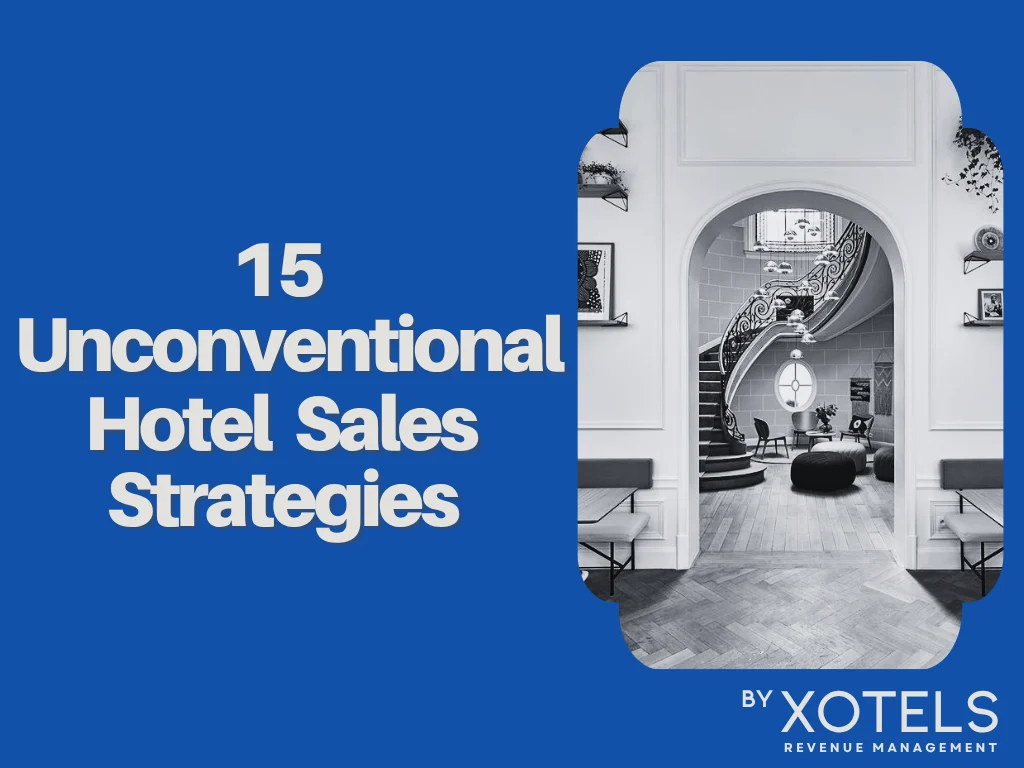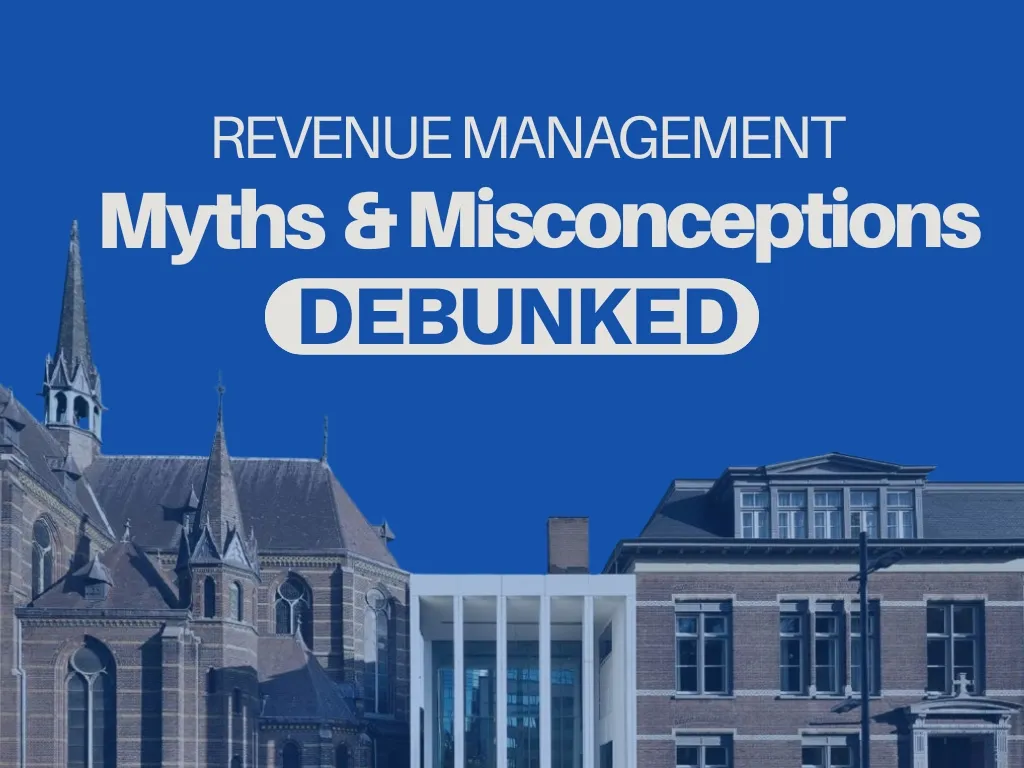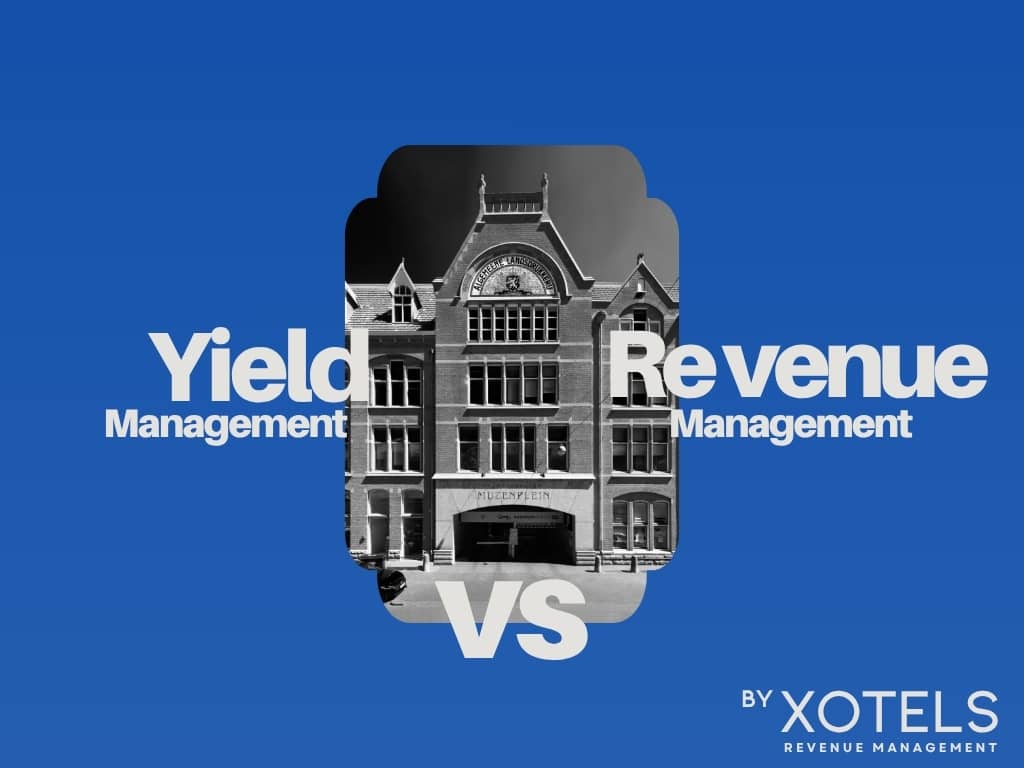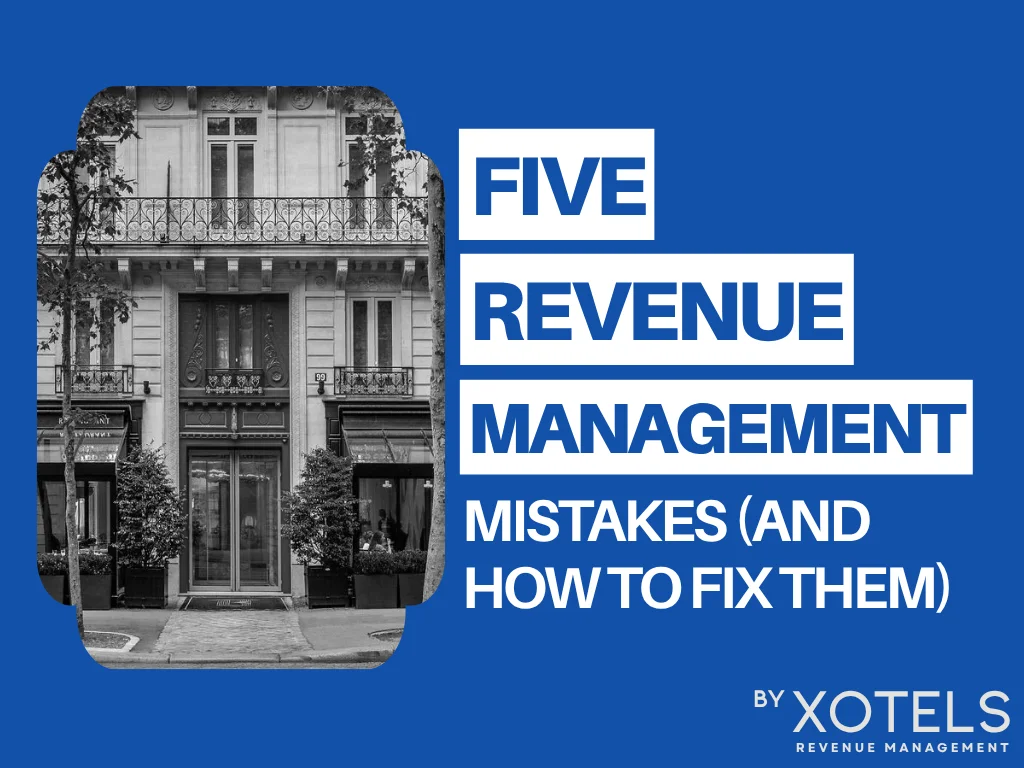What is Hotel Revenue Management?
XOTELS – Revenue Management eBook
In the first chapter of this eBook, we will go over the definition of what is revenue management in the hotel and hospitality industry. Everything will be explained from the fundamentals of revenue management to more advanced practices and strategies.
Start increasing your revenue today by reading our all-in-one ultimate guide on what is revenue management from our expert perspective as a hotel revenue management consulting company.
Article Summary:
- What is the Definition of Revenue Management?
- History of Revenue Management: Where It All Started
- Yield Management vs. Revenue Management – What is the Difference?
- Why is Revenue Management Important to Hotels & Other Industries?
- What Makes Hotels Suitable to Apply Revenue Management?
- What Does the Process of Revenue Management Look Like?
- Revenue Strategies & Tactics
- External Factors
- Revenue Management KPIs
- Revenue Management Tools & Technology
- Benefits of Revenue Management in the Hotel Industry
- Outsourcing & Turning Revenue Management into a Competitive Advantage
- Conclusion: Continue Reading on What Revenue Management is All About…
What is the Definition of Revenue Management?
Many define revenue management as: “Selling the Right Room to the Right Client at the Right Moment at the Right Price.” We always aim to be more specific – so we like to add the following to that sentence: “On the Right Distribution Channel with the best commission efficiency”
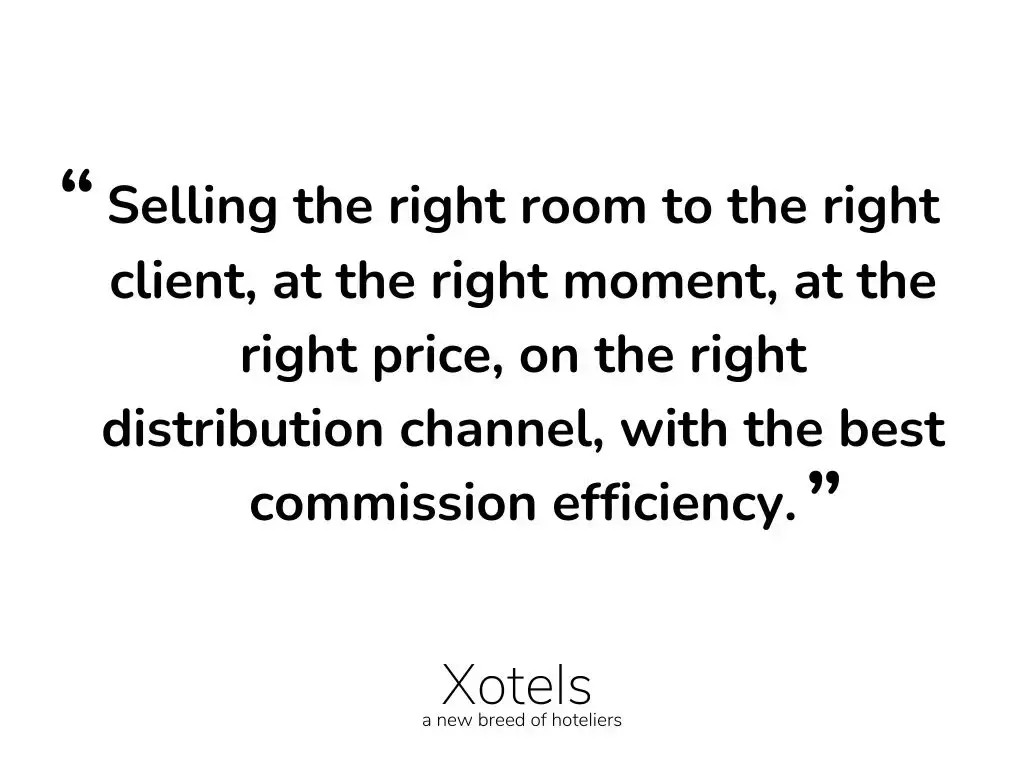
To continue, the answer to what is revenue management can be answered in many ways, but defining what it is not is possibly the most important. The answer is unironically simple:
- Never choose a cookie-cutter approach – a one-size-fits-all approach has never given a hotel optimal performance – believe us.
- Always be ready to shift to any unexpected changes – being agile is what gets you ahead of the competition and allows you to be a market leader.
In short, a disciplined approach and thorough understanding of your property, its customers, and the market, it is key to driving the revenue success of your business.
More in detail, the following factors are key, namely:
- Know Your Property: Recognize the unique selling points and weaknesses of your property for effective positioning and exploration opportunities to yield better.
- Regular Follow-ups: Continuously aim to spot new trends in your reports, monitor market trends, guest preferences, and competitor strategies to stay ahead.
- Control Inventory and Prices: Optimize revenue by strategically managing room availability and pricing across all distribution channels.
- Prompt Reactions: Respond swiftly to market fluctuations, demand shifts, and competitor actions.
- Channel Management: Effectively manage online and offline distribution channels to reach the right audience and convert the right (high-value) reservations.
- Communication: Maintain open lines and avoid silos with stakeholders and departments to ensure everyone is aligned with revenue goals and strategies.
History of Revenue Management: Where It All Started
In the 1980s, prior to its implementation in the hotel sector, the practice now recognized as revenue management went by the name of yield management. Its inception traces back to the airline industry, where the primary objective was to optimize financial outcomes. This marked the adoption of dynamic pricing strategies within the expansive aviation sector. As time progressed, numerous other industries embraced the revenue management approach, integrating it as a foundational strategy for their business operations.
Among the sectors that have incorporated revenue management are:
- Car Rental (dynamic pricing matching high and low demand, ability to offer upgrades or other benefits during off-peak periods).
- Train Companies (similar dynamic pricing as seen in the airline industry)
- Theatres and Cinemas
- Higher ticket prices for premieres, peak hours, or other high-demand days like weekends.
- Conversely, lower prices for unpopular times can entice people who would otherwise not go and fill up the space during off-peak hours and relieve pressure on staff during peak hours.
- Restaurants (increased special peak hour pricing or lower prices for the slowest days of the week to fill the restaurant).
- IKEA (offering lower prices at times when it is least busy).
In fact, almost every industry would benefit in some way from the use of Revenue Management techniques.
Yield Management vs. Revenue Management – What is the Difference?
The difference between Yield Management and Revenue Management is in the overall strategy, including in-depth analytics and forecasting. Yield management denotes the actual price optimization part – and revenue management goes way beyond in its complexity of different aspects, terms and techniques.
Why is Revenue Management Important to Hotels & Other Industries?
Revenue management serves as a predictive tool for anticipating consumer demand, optimizing inventory, and strategically adjusting pricing to maximize revenue growth. In the context of revenue management, the goal isn’t only to sell a room at a low price today with the intention of selling it at a higher price tomorrow. Instead, it involves the strategic decision to offer a room at a lower price today when higher demand isn’t anticipated.
This approach challenges resources to prioritize gathering market information, fostering a proactive rather than reactive stance. Leveraging this information allows for market segmentation, product adjustments through distribution, and the precise targeting of the right customer at the right time and price.
Revenue management is a versatile concept that not only aims to maximise revenue during peak demand periods but also seeks to stimulate demand during slower periods, all while avoiding pricing cannibalism. The strategies involved address both short and long-term actions, constantly balancing revenue and profitability considerations. This flexibility even allows for applying lower rates during high-demand periods when deemed strategically advantageous.
What Makes Hotels Suitable to Apply Revenue Management?
Applying revenue management is suitable in situations where a dynamic approach to pricing and inventory management can significantly impact a hotel’s profitability.
Revenue managers who effectively apply revenue management practices require specific characteristics, all of which are inherently rooted in the hotel industry:
- Fixed Capacity: Hotels, with their finite number of rooms, inherently possess fixed capacity, a foundational element for revenue management strategies.
- Perishable Product: In the hotel industry, each room is a perishable product, available for sale on a given day. This perishability stems from the dynamic nature of time, where a room not sold today becomes essentially “expired” tomorrow.
- High Fixed Costs & Low Variable Costs: The hotel industry typically features high fixed costs (e.g., property maintenance) and comparatively low variable costs (e.g., incremental expenses per occupied room), aligning with the cost structure conducive to effective revenue management.
- Differential Pricing: Revenue managers can adjust prices for the same product—rooms in this context—based on various factors, allowing for flexible and dynamic pricing strategies.
- Evolving Demand: Demand in the hotel industry fluctuates due to factors such as seasons, day-to-day variations, and distinctions between weekends and weekdays. This dynamic demand necessitates adaptive revenue management practices.
- Advance Sales: The hotel product, represented by rooms, can be sold in advance, enabling revenue managers to strategically plan and optimize occupancy levels over time.
- Market Segmentation: The hotel market is intricately segmented, accommodating diverse customer groups, including groups and promotional segments. This segmentation provides opportunities for targeted pricing and marketing strategies. Always keep an eye on emerging markets. Targeting specific groups such as the growing senior segment with specialized offers catered to their needs, or even entire countries that could move take a place as one of your main feeder markets – such as China´s increasing middle-class driving travel across the globe with their disposal income.
What Does the Process of Revenue Management Look Like?
To be 100% clear on how an ideal revenue operations process would look like, we at XOTELS always strongly recommend seeing revenue management as a process. More specifically, it is a continuous process, as illustrated below. After the cycle has been completed, the process starts all over again. This characterizes truly robust and impactful revenue strategies – giving you the agility and ability to navigate any challenges and become a market leader.
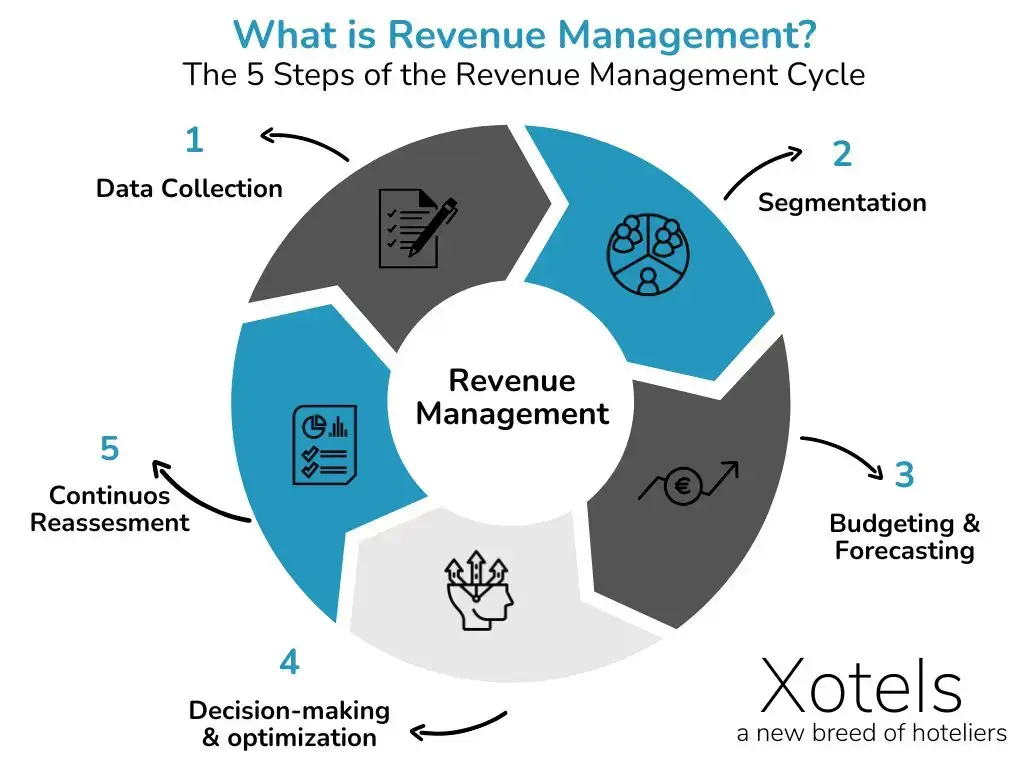
The 5-Step Revenue Management Cycle, Defined by XOTELS
Now we have the process clearly defined, we advance below with revenue strategies and tactics.
Revenue Strategies & Tactics
There are some essential revenue management strategies and tactics that will make or break the succes of your hotel. Let´s explore:
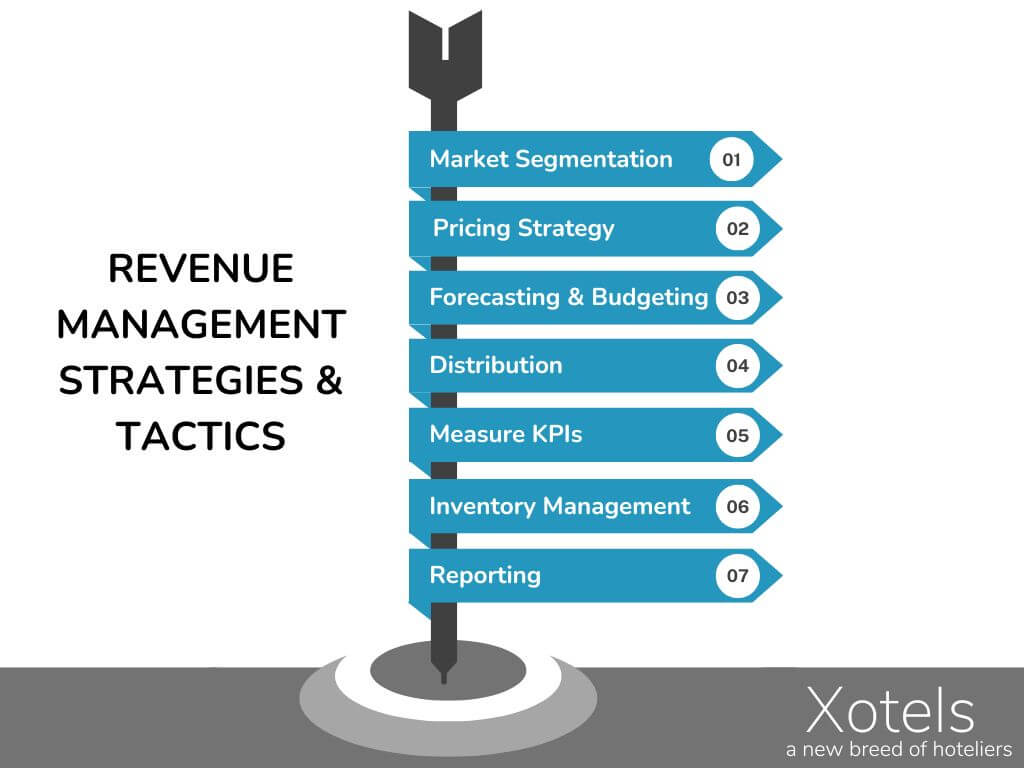
Market Segmentation
Without going too deep into one of the cornerstones of revenue management, market segmentation, it is important to mention that effective segmentation allows revenue managers to target and market to a variety of consumer groups with different behaviours with an offer that matches their needs and budget level. Market segmentation can be approached through various lenses, and some key avenues are demographic segmentation, psychographic factors, etc. The ability to cater to diverse needs and preferences of different customer segments positions a hotel to maximize occupancy rates, boost customer satisfaction, and drive sustained revenue growth.
Hotel Pricing Strategies
Hotel pricing strategy in revenue management involves a dynamic approach to setting room rates in order to maximize revenue and profit. It goes beyond simply establishing fixed prices and instead relies on real-time data, market demand, and various influencing factors to determine the optimal rates for hotel rooms. The goal is to find a balance between attracting guests with competitive pricing during periods of low demand and capitalizing on higher rates during peak demand periods.
Revenue management strategies typically include decisions based on historical booking data, competitor pricing, seasonal trends, local events, and customer behaviour. Hotels may adjust prices regularly based on these insights to optimize revenue. Additionally, hotels often employ tactics such as discounts, promotions, and dynamic pricing to respond quickly to changes in demand and market conditions.
Forecasting & Budgeting Properly
Accurate demand forecasting plays a crucial role in optimizing a hotel’s revenue by predicting future business outcomes. Optizming the precision of your hotel’s revenue forecast involves incorporating various outcomes from diverse forecasting methods, ensuring a comprehensive and resilient analysis. The responsibility of the revenue manager is to evaluate the multiple outcomes generated by a forecast and adeptly address the implications and potential deviations from the adopted strategy. This multifaceted approach contributes to a more informed and strategic decision-making process.
Simultaneously with forecasting your hotel’s revenue, it is essential to take into account your hotel’s budget plan. This plan provides insights into how your hotel’s revenue will be generated and allocated each month throughout the upcoming year to accomplish your objectives. Budgeting empowers hotels to guarantee a steady flow of funds each month, facilitating the timely payment of bills and allocating funds for various expenses, including investments. This proactive financial planning ensures the availability of adequate resources to meet financial obligations and strategically allocate funds for future growth and development.
How to Distribute Your Rooms Effectively?
Distribution is all about finding a balanced approach that works for your hotel. Making sure to be on the right channels with the right strategy is when the best successes can be booked for your hotel. The main distribution channels are:
- Groups: Private groups, Schools, event planners, travel planners, etc.
- Business/Corporate: Direct contract with companies in return for special/reduced prices or other benefits.
- The Hotel’s Own Website (and Booking Engine)
- Online Travel Agencies (OTAs): Booking.com, Expedia, Airbnb, etc.
- Metasearch Engines: Aggregates hotel prices from various online sources, providing users with a comparison tool. Ensuring visibility on these platforms enhances a hotel’s chances of being selected during the booking process – and offers the chance to drive direct reservations as well.
- Social Media Channels: Instagram, Facebook, TikTok, etc.
- Bed Banks: Companies that contract hotel rooms from travel suppliers and market them to 3rd-party resellers.
- Global Distribution System (GDS): A GDS system can be defined as a worldwide reservation system that acts as a platform to connect travel bookers or suppliers and hotels.
Need more tips on distribution? Read our Top 5 Distribution Tips for Hotels.
Room Type & Inventory Management
A well-thought-out room-type strategy is a fundamental tactic to maximize yielding opportunities. For example, building various room type categories will allow you to apply supplements and restrictions between different room categories. The extra revenue and control over availability this provides is an essential technique at the disposal of revenue managers.
Upselling & Ancillary Revenue
Driving incremental revenue to your hotel through focusing on ancillary revenue and upselling is a great way to increase revenue, namely because the quality of service offered to your current guests can be increased. Making sure that the services/products offered clearly add value to the overall guest journey is therefore crucial. Small and larger contributions can both lead to an increase in the revenue per customer and guest satisfaction, a powerful combination that will add up to meaningful gains in the long term.
Learn more about how to generate ancillary revenue in your hotel or resort.
Protect YOUR Brand!
Nowadays, there are techniques such as brandjacking that can affect the visibility of your official website causing many of the bookings to be consolidated through other platforms or booking engines that will take away the credits that correspond to you for the online presence of your hotel.
But let us go back to the beginning, what do we mean when we talk about brandjacking? Through this technique, unauthorized and often malicious use is made of the name, logo or identity of a brand by individuals or entities with the intention to deceive.
This could seriously impact directly on your hotel income which is why preventing brandjacking requires a proactive and vigilant approach to safeguard your brand’s identity, reputation and hotel revenue.
External Factors
Talking about making revenue management decisions without addressing external factors would be an ill-advised approach to follow. So, let us highlight some important topics that could be of influence:
- Data Availability & Big Data
- Access to extensive data sets can contribute significantly to setting realistic goals within revenue management strategies. Analyzing customer behaviour, market trends, and competitor dynamics through Big Data enables more accurate forecasting and decision-making.
- Evolving Metasearch Trends
- Metasearch will continue to play an important role in the distribution landscape for hotels. Make sure to stay on top of the latest developments, especially when it comes to continued efforts of Google Hotel Ads to penetrate the metasearch landscape further.
- Tech Development
- Just like any industry, technology will always keep evolving. In hospitality, and more specifically in revenue management, this is no different. Whether it is AI or the latest revenue tool, do not get fooled into implementation too quickly. The main rule we always suggest living by is that no matter how impactful a new initiative might seem, always do your due diligence and especially assess how this new technology adds value to your own team specifically. Again, not all implementations will fit your or your team’s or brand’s needs – or pose a significant value-add.
- Meeting the Needs of the Modern Guest
- We have highlighted this topic as a key challenge to the hotel industry before, and it remains vital to providing the perfect hotel guest experience. As revenue managers, we have to ask ourselves how this can translated into impactful revenue actions. As explained in our previous articles, prioritising a clear value-add according to your guests’ needs and aligning these needs across different hotel departments is the only way to make a meaningful impact on revenue performance and guest satisfaction.
Revenue Management KPIs
KPIs are the gateway for revenue managers to assess hotel performance. Here is a short list of some of the most important metrics used on a daily basis:
- RevPAR (Revenue Per Available Room), is the most important financial calculation for any hotel to see how much revenue they have made within a certain period of time. Its formula is RevPAR = Rooms Revenue / Rooms Available
- OCC (Overall Occupancy Rate) shows the percentage of available rooms or beds being sold for a certain period of time. OCC= Rooms Sold / Rooms Available
- ADR (Average Daily Rate), it is a KPI used to calculate the average price or rate for each hotel room sold for a specific day. You can calculate it with this formula: ADR= Room Revenue/Rooms Sold
- GOPPAR (Gross Operating Profit Per Available Room), allows hotels to apply the laws of economics to a complete drill down of the process of revenue management and make adjustments not only on achieving the top line but aligning it with the bottom line as well. GOPPAR Formula: GOP (Gross Operating Profit) / Available Rooms
- TREVPAR (Total Revenue Per Available Room), it provides a preview of the total revenue from all departments which the room can generate. TREVPAR Formula: Total Revenue / Total Available Rooms
Of course, there are many more metrics involved in revenue management. Want to see the full list? Check out our list of KPIs or browse our extensive Hotel Glossary explaining every important term in our industry.
Revenue Management Tools & Technology
In the dynamic landscape of the hospitality industry, revenue management tools and technology have become indispensable assets for optimizing financial performance. These tools leverage advanced analytics, data-driven insights, and automation to assist businesses in setting strategic pricing, managing inventory, and maximizing revenue. From dynamic pricing algorithms to sophisticated forecasting models, these technologies empower organisations to adapt to fluctuating demand, stay competitive, and make informed decisions in real-time. In this ever-evolving field, embracing cutting-edge tools is not just a competitive advantage but a fundamental necessity for hotels aiming to thrive in the complex and highly competitive world of revenue management.
Some of the most used tools and technologies in revenue management are:
- (PMS) Property Management System: Gathers vital guest data for segmentation and forecasting purposes.
- (RMS) Revenue Management System: Analyzes historical, competitor, and market data, providing pricing recommendations.
- Channel Manager: Streamlines the booking process, ensuring consistent rates and pricing decisions across channels.
- (IBE) Internet Booking Engine: Facilitates direct bookings and consolidates rates and upsells in a unified platform.
Benefits of Revenue Management in the Hotel Industry
If done right, revenue management goes way beyond just price optimization. A truly seasoned and well-experienced revenue expert will be able to maximize revenue opportunities across a highly diverse range of income streams.
Why this is beneficial for hotels is clear in our eyes, to name a few points:
- Saturated Market: with more hotels forecasted to open every year, gaining a fair market share will become more difficult each year. Without revenue management, a hotel will just get lost in the pile of other hotels – being unable to reach satisfactory visibility and level of business to remain open.
- Complex Distribution Mix: opportunities are abundant – but trying to find the right distribution mix and deciding what your hotel needs to make revenue is where hoteliers get lost in the giant maze of channels available. Also, gone are the days of selling the majority of your rooms through OTAs. Without a healthy distribution mix including a strong website and direct sales, you can forget about your profit margins.
- Understanding the Complexity of How Demand Works in our Industry: Of course, we know that flat pricing is not how hotels can maximize their revenue, but what lies at the other end of the spectrum? You cannot just apply different prices and restrictions per day without a plan in place – as you can easily do more harm than good.
Outsourcing & Turning Revenue Management into a Competitive Advantage
Imagine being always the first to respond to changes in demand, effectively reach new customer segments and markets first, and sell every room at optimal conditions every day. This is what we call turning revenue management into a competitive advantage. Always getting the most out of the available revenue opportunities – and going above and beyond each time leaving no stone unturned.
Now how would this work in practice? What is needed to put this into place for your own hotel? Independent hotels typically lack the resources and capabilities to fully maximise their revenue potential – so what could be the solution?
This is where outsourcing comes in. After extensively covering why hotels should outsource their revenue management operations – we can condense the conclusions into a few strategic advantages:
- Time Savings:Outsourcing allows all the heavy lifting to be done by your outsourcing partner – staying in the loop on the most crucial parts of your hotel business without having to deal with all the technicalities will never have been easier.
- Assessing Qualifications & Actions of Internal Hires:It will be hard to sufficiently qualify the skills of a potential RM candidate – let alone understand the actions taken on a day-to-day if you have not been an RM yourself.
- Combating Employee Turnover:Turnover tends to be high as RM’s are always on the lookout to grow in their career – and opportunities are abundant in an especially tight niche labour market such as Revenue Management.
- Heavy Overvliance on an Individual’s Niche Specialist Skills: Overreliance on your staff member’s individual skillset and experience can be a critical limitation, or even worse, fatal in cases where the individual does not have the skillset to navigate challenges or tap into new opportunities that arise. Outsourcing brings in a whole team of experts with different viewpoints and highly diverse property-type knowledge.
Uncover the hidden revenue potential of your hotel
or resort.
Continue Reading on What Revenue Management is All About…
Get a deeper understanding of Revenue Management by reading our free eBook to dive deeper into the concept of revenue management, or contact us directly for hotel revenue management consulting or hotel management services to increase your hotel’s performance.
More Free Resources
Popular Posts
Blog Categories
Share This Story, Choose Your Platform!

About the Author:
As CEO and Founder of XOTELS, Patrick Landman has made it his mission to turn hotels and resorts into local market leaders. XOTELS´ diverse expertise and deep-knowledge across revenue management consulting, hotel management, and hotel consulting, enables us to drive results for independent boutique hotels, luxury resorts, and innovative lodging concepts. Below you will find opinion articles written by Patrick Landman.


